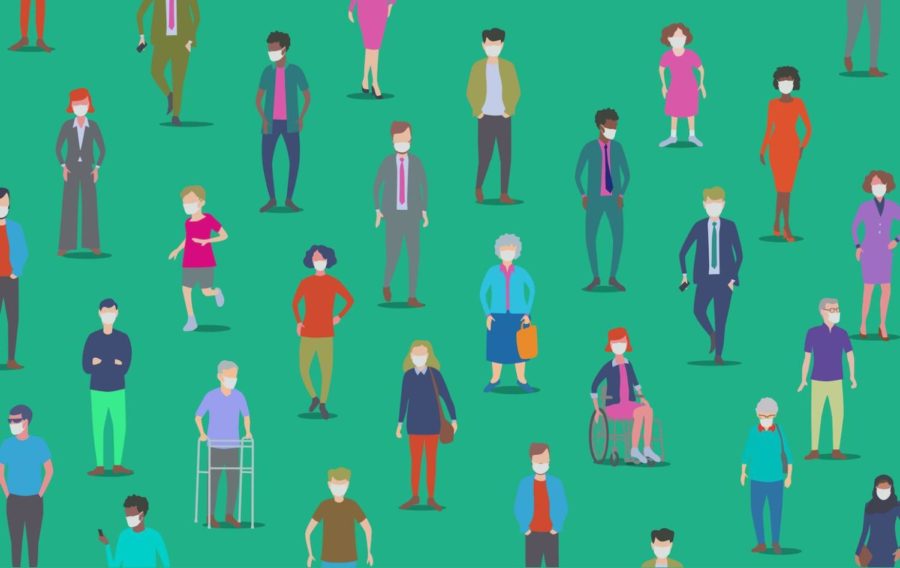What the COVID-19 pandemic is teaching people about ableism
November 22, 2022
Content warning: ableism
There is an idea that nondisabled people “earn” their access; this is the paradoxical thought pattern of “I deserve access because I am not disabled. I am not disabled because I am a strong person. I am a strong person because I have access.” People fear disability because that would mean they are no longer deserving of access; of autonomy over how they can move or not move, act or not act, in the world. However, this loss of autonomy isn’t due to disability itself but the lack of access provided by society as a whole. The social model of disability derived from labour relations, described by Marta Russell in her book Capitalism and Disability, states that capitalist society is structured around non-disabled bodies because disabled bodies are less exploitable, leaving disabled people without accommodations. Disability justice activist and academic Megan Linton called this “handicapitalism” on a panel hosted by the Disability Justice Network of Ontario: “So much of it is bound up in what these institutions were created to do – which was to put people away so that more people could be working, so that more people could be creating profit.” That fear of disability allows regular non-disabled people to feel comfortable with being complicit in how ableist systems push disabled people aside, whether that be through active participation or just finding it acceptable enough to ignore.
Nora Loreto, an independent journalist who spent the last two years keeping track of COVID-19 deaths in residential care (data visualized here), expressed on the DJNO panel that a crisis like the COVID-19 pandemic only exacerbates the ableism inherent to these systems. One of these systems is long-term care: facilities that emerged from workhouses (also known as poorhouses or almshouses) in the Elizabethan era which housed incarcerated, disabled, and elderly people in low-quality conditions. These were then brought to what was then called Upper Canada, and now have the highest proportion of COVID deaths in the country. Dr. Amit Arya said on the same panel, “From years of working as a palliative care doctor, I have yet to meet someone who wanted to go to a long-term care facility … Almost everyone that I meet wants to be in … their own home and the system fails to do that. Long-term care is a disposition or a place that people go where the means to survive and actually do well are completely removed from them everywhere else.” According to Dr. Arya, Canada gives about 80% of funding to long-term care while the remaining 20% goes to home care, showing how the state itself values—as Megan Linton put it during the panel—“warehousing people away,” more than giving disabled folks the care they really want and need.
Not everyone is in or knows someone in long-term care; why should it matter to them? Long-term care is an example of settler-colonial Canadian society’s “out of sight, out of mind” disposition towards disabled and elderly folks driven by that fear of disability. This matters because everyone has a part to play in upholding ableism, some more than others. The next step now for anyone who wants to examine where ableism is present in their own lives is to look at the attitudes and systems around them. Does the family want to travel already because the pandemic is over for non-immunocompromised folks? Do folks at school think of masking as unnecessary because there’s no risk for non-immunocompromised folks? Are the concerts and shows and live events starting up everywhere because it’s safe now regardless of how inaccessible it makes these events to immunocompromised folks? Knowing that some prisons and long-term care facilities have a shared origin, what does that say about how society treats incarcerated people? Especially an ableist society where it’s possible for 100% of people incarcerated in one Ontario jail to be disabled and, thinking about the intersections of race, Indigeneity, and disability, where 90% of those people are Indigenous? In a world where the director of the CDC says that it’s “encouraging” that “people who were unwell to begin with” are being hit by COVID the hardest, these are the questions the disability justice framework prompts people to ask.
Disability justice advocate and writer Leah Lakshmi Piepzna-Samarasinha writes in their op-ed on Truthout: “Maybe I was naive. I thought many people, while hating the pandemic, liked some of the access features it [brought]. I still think that. I also think that most people at heart must care about others and want us all to stay alive. But internalized ableism is real. A lot of people have had a brush with what it’s like to live a disabled life these last two years, and a lot of them want to forget it as quickly as possible. They’d rather expose themselves to all kinds of harm than continue to be disabled like us — mask, discuss risk, stay home, pass public policies for the safety of all.”
Sources
- https://lessexploitableleslie.wordpress.com/2020/05/17/disability-and-capitalism/
- https://docs.google.com/spreadsheets/u/0/d/1M_RzojK0vwF9nAozI7aoyLpPU8EA1JEqO6rq0g1iebU/htmlview
- https://public.tableau.com/app/profile/andrew.lam3968/viz/CanadaLTCCOVID-19Deaths/LTC_Deaths_Canada
- https://www.youtube.com/watch?v=1NFxSBEGFDY
- https://canadiandimension.com/articles/view/stuck-in-the-past-time-to-free-canadas-long-term-care-system-from-its-backward-history
- https://www.cihi.ca/sites/default/files/document/covid-19-rapid-response-long-term-care-snapshot-en.pdf
- https://www.nia-ryerson.ca/commentary-posts/2020/9/22/almost-100-per-cent-of-older-canadians-surveyed-plan-to-live-independently-in-their-own-homes-but-is-this-even-possible
- https://disabilityvisibilityproject.com/2021/06/08/disability-death-the-fight-for-justice/
- https://www.ohrc.on.ca/en/re-mcscs-corrections-reform-findings-tour-kenora-jail
- https://www.sinsinvalid.org/blog/10-principles-of-disability-justice
- https://www.goodmorningamerica.com/news/video/cdc-director-responds-criticisms-covid-19-guidance-82131389
- https://truthout.org/articles/abled-bodied-leftists-cannot-abandon-disabled-solidarity-to-move-on-from-covid/

